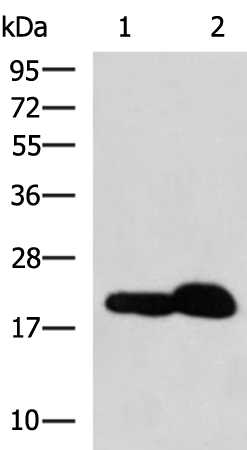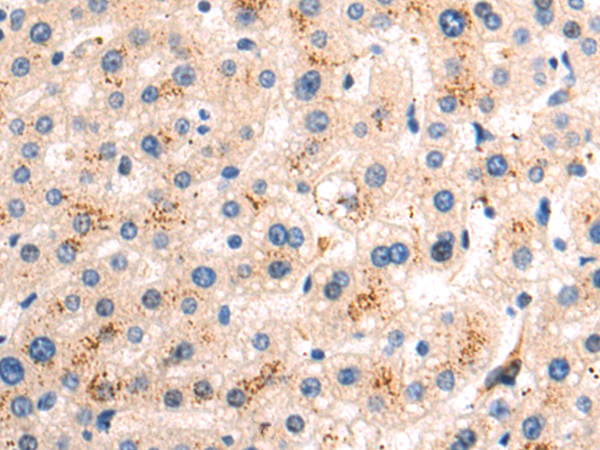

| WB | 咨询技术 | Human,Mouse,Rat |
| IF | 咨询技术 | Human,Mouse,Rat |
| IHC | 1/50-1/200 | Human,Mouse,Rat |
| ICC | 技术咨询 | Human,Mouse,Rat |
| FCM | 咨询技术 | Human,Mouse,Rat |
| Elisa | 1/5000-1/10000 | Human,Mouse,Rat |
| Aliases | AD3; FAD; PS1; PS-1; S182; ACNINV3 |
| WB Predicted band size | 53 kDa |
| Host/Isotype | Rabbit IgG |
| Antibody Type | Primary antibody |
| Storage | Store at 4°C short term. Aliquot and store at -20°C long term. Avoid freeze/thaw cycles. |
| Species Reactivity | Human, Mouse |
| Immunogen | Synthetic peptide of human PSEN1 |
| Formulation | Purified antibody in PBS with 0.05% sodium azide and 50% glycerol. |
+ +
以下是关于PSEN1抗体的3篇参考文献的简要列举:
---
1. **文献名称**:*"Characterization of a monoclonal antibody against human presenilin 1"*
**作者**:Annaert W. et al.
**摘要内容**:该研究报道了一种针对人源PSEN1蛋白的单克隆抗体的开发与验证。通过免疫印迹和免疫荧光实验,证明该抗体能特异性识别PSEN1的C端区域,并成功用于检测细胞系及脑组织中的PSEN1表达水平,验证了其在阿尔茨海默病模型中的应用潜力。
---
2. **文献名称**:*"Differential specificity of presenilin-1 and presenilin-2 antibodies developed for transgenic mouse models"*
**作者**:Saura C.A. et al.
**摘要内容**:文章系统比较了多种市售PSEN1/PSEN2抗体的特异性,重点分析了在转基因小鼠脑组织中的交叉反应性。结果显示部分抗体存在非特异性结合,强调了抗体验证对神经退行性疾病研究的重要性,并推荐了适用于不同实验场景的高特异性PSEN1抗体。
---
3. **文献名称**:*"Presenilin-1 antibody labels amyloid plaques in human Alzheimer's disease brain"*
**作者**:Li J. et al.
**摘要内容**:该研究利用抗PSEN1抗体对阿尔茨海默病患者脑组织进行免疫组化分析,发现PSEN1蛋白在淀粉样斑块周围异常聚集。结果提示PSEN1可能直接参与β-淀粉样蛋白沉积过程,为疾病机制研究提供了新线索。
---
**备注**:若需获取全文或更多文献,建议通过PubMed或Web of Science以“PSEN1 antibody”及“presenilin-1 immunodetection”等关键词进一步检索。
PSEN1 (Presenilin 1) is a critical component of the γ-secretase complex, which plays a key role in the proteolytic processing of amyloid precursor protein (APP) to generate amyloid-β (Aβ) peptides, including the pathogenic Aβ42 species implicated in Alzheimer’s disease (AD). Mutations in the PSEN1 gene are the most common cause of early-onset familial AD, leading to altered γ-secretase activity and increased Aβ42 production. PSEN1 antibodies are essential tools for studying the expression, localization, and function of PSEN1 in both physiological and pathological contexts.
These antibodies are widely used in techniques like Western blotting, immunohistochemistry, and immunofluorescence to detect PSEN1 in cell lines, animal models, and human tissues. They help investigate PSEN1’s role in Aβ generation, synaptic function, and cellular signaling pathways. However, studies using PSEN1 antibodies occasionally report discrepancies, possibly due to variations in antibody specificity, isoform detection (e.g., full-length vs. cleaved forms), or tissue-processing methods. Some antibodies target specific regions, such as the N-terminal or C-terminal domains, influencing their applicability in different experimental setups.
Research with PSEN1 antibodies has also highlighted its involvement beyond AD, including roles in calcium homeostasis, autophagy, and cancer. However, challenges remain in distinguishing PSEN1 from its homolog PSEN2 and other γ-secretase components. Validating antibody specificity using knockout controls remains crucial. Overall, PSEN1 antibodies continue to advance our understanding of AD mechanisms and potential therapeutic targets.
×